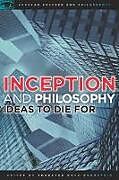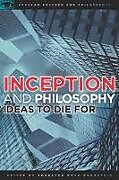Inception and Philosophy
Einband:
Kartonierter Einband
EAN:
9780812697339
Untertitel:
Ideas to Die For
Genre:
Philosophie & Religion
Herausgeber:
Open Court
Anzahl Seiten:
288
Erscheinungsdatum:
01.11.2011
ISBN:
978-0-8126-9733-9
“The authors of Inception and Philosophy: Ideas to Die For will take you downwards and forwards. They’ll plant seeds that grow in your mind. When you come out of it on the other side, you'll find that many things you think you believe never really made sense, and you’ll wonder why you ever thought they did. Pick it up, start reading, wait for the kick.”
—D.E. Wittkower, Assistant Professor of Philosophy, Old Dominion University
“Inception is one of the most philosophically compelling movies to come out in the past twenty years or more. Reading Inception and Philosophy: Ideas to Die For is like waking from a dream. It could be just that.”
—Richard Greene, co-editor of Dexter and Philosophy
“Not since The Matrix has there been a movie so philosophically rich as Christopher Nolan’s Inception. If I had Dom Cobb’s powers, I would plant just one simple idea—resilient, highly contagious—in the minds of bookstore browsers everywhere: Read Inception and Philosophy: Ideas to Die For.”
—Amy Kind, Associate Professor of Philosophy, Claremont McKenna College
“Nothing can kick-start excited conversations on the gnarly nature of the mind quite like the movie Inception and a bunch of passionate philosophers.”
—Luke Dick, writer, artist, singer, philosophy professor
Autorentext
Thorsten Botz-Bornstein is Assistant Professor of Philosophy at the Gulf University for Science and Technology in Kuwait. He is the author of numerous philosophy books, and he lives in Kuwait.
Klappentext
You have to go deeper. "Inception" is more than just a nail-biting heist story, more than just one of the greatest movies of all time.
The latest neuroscience and philosophy of mind tell us that shared dreams and the invasion of dreams may soon become reality. "Inception and Philosophy: Ideas to Die For" takes you through the labyrinth, onto the infinite staircase, exploring the movie's hidden architecture, picking up its unexpected clues.
How will "Inception" change your thinking? You can't imagine.
How will "Inception and Philosophy change your life? You simply have no idea.
Zusammenfassung
"Inception", starring Leonardo DiCaprio, is the one of the most philosophical and disturbing movie since "The Matrix". The very idea that our dreams and reality are one and the same has caused many sleepless nights and deep, vexing conversations around the world. This title examines the complicated dream theme from various angles.
Leseprobe
THORSTEN BOTZ-BORNSTEIN is Assistant Professor of Philosophy at the Gulf University for Science and Technology in Kuwait and author of Films and Dreams (2008).
Introduction: Who’s Putting Ideas in Your Head?
Two and a half thousand years ago Plato asked: How exactly can we explain our perceptions of reality? The top has been spinning ever since.
Dreams are the original virtual reality. For thousands of years dreams have been ransacked for hidden memories, messages, desires, fears, and secrets.
Dreams are generally weird and sometimes seem absurd, but they don’t usually feel weird when we’re in them. When we wake up from a dream, we’re surprised to find that in the dream we accepted as real many things we now automatically reject as preposterous. But maybe we’re now accepting other things we would find equally preposterous if we could wake up from what we call waking life.
Dreams are often tremendously intricate and detailed. If the world of the dream isn’t real, who made it up? We know that we most certainly didn’t. So where does this world come from? Although strange things can happen in a dream, not anything can happen. We have only limited control over what goes on in our dreams. They have strict laws of their own. Dreams possess a deadly, implacable logic, which may sometimes frustrate or terrify us.
Many viewers enjoy Inception as a story while telling themselves that nothing like this thrilling tale could happen in real life. But (as Chapters 1 and 2 of this book explain) modern neuroscience and philosophy of mind have been showing that most of what occurs in Inception could become hard reality very soon. We almost have the technology to perform inception by way of shared dreams.
To watch Inception is to get into endless discussions about what’s really going on in the movie. Various theories are kicked around in this book. At one extreme, there’s the theory that the entire movie is just a single dream: Cobb’s dream on the long airline flight. This theory appeals to psychoanalysts and takes care of a lot of troublesome problems with the story: it’s expounded by Nicolas Floury in Chapter 17. We guarantee that once you’ve read Nicolas’s chapter, you’ll never again be able to watch Inception without finding one confirmation after another of the single-dream theory.
A very different—but equally ingenious and equally haunting—interpretation is given by Randall Auxier in Chapter 21. Randy proposes a theory that explains most of the difficult or apparently inconsistent points in the story, but which many fans of the movie will find quite startling.
Matthew Brophy takes a different tack in Chapter 14, arguing that the dreams in which Cobb and his team navigate are actually electronic dreams. They don’t exist in the individuals’ brains but on a server. This is why, for Cobb, Mal has become Mal-ware. Technology has made shared dreaming possible: computer users regularly jack in and populate worlds created by programming architects. Forty-three percent of residents of virtual worlds such as Second Life report that they feel at least as strongly about their virtual community as they feel about the real world. Are they walking away from the real world just as Dom Cobb did? Or are they simply walking from one reality to another? For some people, one reality just isn’t enough.
Three and a half centuries ago, René Descartes pointed out that, logically, we can never be sure we’re not dreaming. Yet while Descartes called into question the reality of our experience, he did not doubt that our thoughts are our own. This claim is contested in Inception. And strangely enough, recent findings in neuroscience apparently show that our thoughts cannot possibly be our own (as Janet Testerman explains in Chapter 5)—because we act upon them before we become aware of them!
Inception is not the first movie to develop the theme of “implanted ideas.” In Blade Runner (1982), Rachael plays piano for Deckard in his apartment and remarks that she remembers having had piano lessons. She’s not sure if she actually learned to play, or if her piano-playing abilities are the result of neural implants. In Inception, however, ideas are implanted into the minds of humans, not replicants. And not by chemical means (as in Dark City), but by stealthily breaking and entering people’s subconscious minds via their dreams.
Some people feel bad about what happens in their dreams, though if the dream is purely their own creation, and all the other people in the dream are just imaginary, then why feel bad? Shooting and killing people in dreams can’t be wrong, as they’re not really people. All this changes if we can get into other people’s dreams and share their dream worlds.
We all agree that inception—implanting an idea in someone’s mind—would most often be morally wrong, though we may not agree on exactly why it’s wrong or how wrong it…

Leider konnten wir für diesen Artikel keine Preise ermitteln ...
billigbuch.ch sucht jetzt für Sie die besten Angebote ...
Die aktuellen Verkaufspreise von 6 Onlineshops werden in Realtime abgefragt.
Sie können das gewünschte Produkt anschliessend direkt beim Anbieter Ihrer Wahl bestellen.
Loading...
Die aktuellen Verkaufspreise von 6 Onlineshops werden in Realtime abgefragt.
Sie können das gewünschte Produkt anschliessend direkt beim Anbieter Ihrer Wahl bestellen.
| # | Onlineshop | Preis CHF | Versand CHF | Total CHF | ||
|---|---|---|---|---|---|---|
| 1 | Seller | 0.00 | 0.00 | 0.00 |
